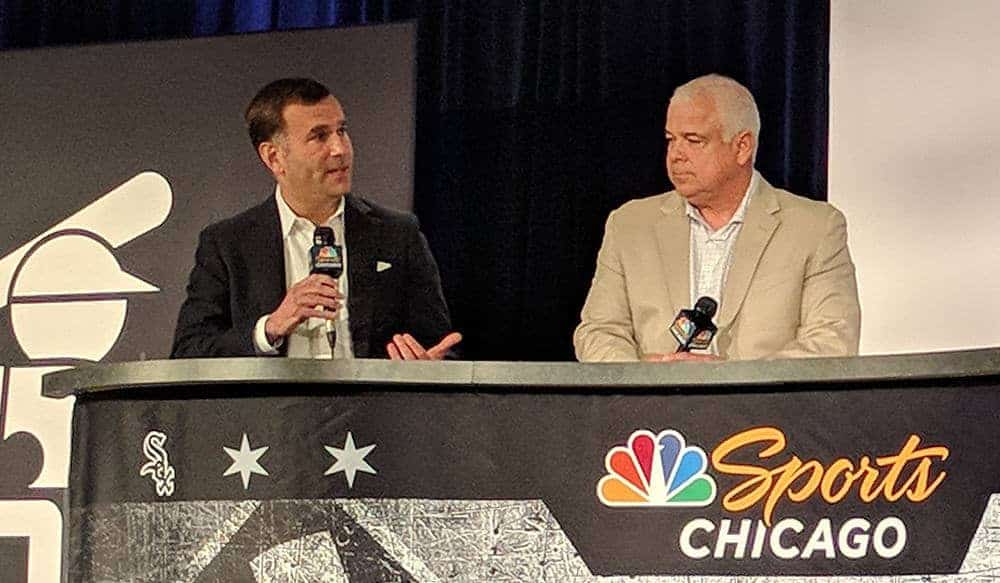When we last heard from Rick Hahn about the 2020 White Sox, his prospectus underwhelmed even for accounting all things he can't say. "Let's see" doesn't quite cut it as a rallying cry for a GM who is under no danger of being fired after seven losing seasons in seven tries at the job, and might still be safe after 17 of 'em.
His end of season summit on Friday offered more to chew on, even if he stopped short of fulfilling my podcast prediction of an end-of-season Jose Abreu extension celebration at Guaranteed Rate Field.
As usual, Hahn avoided overextending himself. When it came to an overall projection, he said that the White Sox were likely to be better on June 1, 2020 than March 26, 2020, and better on Sept. 1 than June 1 regardless of what happens, and he didn't want to establish a floor of expectations until moves are made over the offseason. He didn't even offer specifics for Abreu, except that he likened it to Paul Konerko's dalliances with free agency when it came to eventuality.
But there were other cues signaling a higher gear.
For instance, he said it was "a little premature on the everyone-coming-back conversations" with regards to the coaching staff. He offered compliments to the coaches, saying their player-development backgrounds helped set standards for the youth-infused roster, but said that "we'll deal with specific staffing issues once the season's over."
James Fegan beat me to looking for what Hahn said about the coaches last year, when Hahn said that only other managerial vacancies might prevent the coaching staff from returning.
Take that uncertainty, and then combine it with his comments about the Sox' inability to get on base ...
"You have a guy like (Tim Anderson) who can do damage in and around the zone. You don't really want to take that away from him, so we're not saying, 'Hey, Tim Anderson needs to walk more.' But you want to make sure everyone is swinging at pitches they can do damage on, and not necessarily expanding beyond what they're capable of doing."
... and maybe the Sox are indeed evaluating the way they're approaching a reshaping of uniformed personnel. That doesn't sound like much, but it's way more than usual.
Hahn also drew a distinction between last offseason in this one when asked about pitching free agents on joining the White Sox.
"I was candid last offseason that when you're talking to some free agents -- last year, we were probably a year too soon, so you had to sort of map out what it was going to look like and educate them a little bit about who was coming and how we saw this thing coming together," Hahn said.
"I think over the course of this year we saw a lot of it come together before our eyes, and it's fairly easy to project out who's going be joining us from our system and what that's potentially going to look like. The excitement's there, not just in our clubhouse, but around the game right now."
Is last year was "a year too soon," then logically this year would be the time for action, right? So that's something.
And when asked about potential areas of improvement, Hahn pointed to right field, DH and a starting pitcher or two. These are the same positions Hahn attempted to address last winter, but perhaps Hahn will have more success expanding the pool beyond the friends and family of a major free agent his boss is going to low-ball.
If Hahn pumped the brakes in any regard rhetorically by his standards -- and he usually drives with the parking brake engaged regardless -- it was in regards to the farm system as a whole. When asked about the rough year on the farm, he said, "In 2020, I don't think we are going to be what we targeted for organizational depth just yet."
He couched that by saying that the second tier of the farm system should return form injury, and self-sufficient depth is the last thing to materialize -- which strikes me as highly convenient for a supposed rule of thumb -- but he's only being honest in the sense that dealing from depth will probably be difficult to accomplish without taking a hit on their previous value.
But with a pristine payroll and plenty of room on the 40-man roster, the White Sox have plenty of room for aggression even if they're limited in the trade arena, and with talented players entering their primes and a manager who hasn't lost his clubhouse despite all the losing, this would be the time to give all the success stories some support.
Hahn acknowledged that by saying in his closing comments, "I think we're entering the next stage."
Buuuuuut, because Hahn is Hahn, he also laid out future stages and hurdles, saying "it's going to involve continued growth, and a path towards heightened competitiveness. [...] How quickly we get to the most important stage, that being winning? I think it's premature to say right now."
Maybe Hahn is correct from his perspective and there are distinct differences between "the next stage," "a path towards heightened competitiveness" and "the most important stage." From our distance, it should all look the same: the team's better tomorrow starts by making the team better today.






